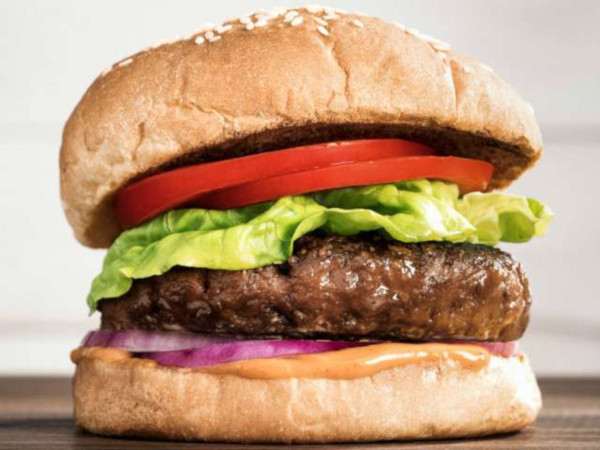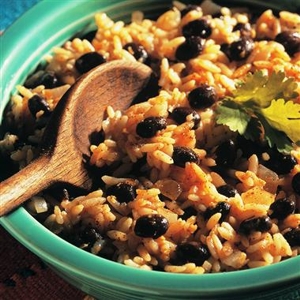We’re all being encouraged to switch from Animal- to Plant-based Protein sources to save the world as we know it from Global Warming. And we’re being told that we may have to make the change in the next decade if it’s to make enough difference. But there are some problems with actually doing that…
 A Beyond Meat ‘Hamburger’: How much do we need the look and feel
A Beyond Meat ‘Hamburger’: How much do we need the look and feel
of real Meat to get satisfaction from Plant-based substitutes?
I, personally, have no issues with making the change. In fact, I relish the challenge of changing my cooking routines and adding new skills to my repertoire to accommodate the change. But I also see some problems that will have to be dealt with if the majority of Meat-eaters on the planet are to follow suit.
Will Plant-based Proteins satistisfy evolving Meat Eaters?
Some cultures have long included Plant-based Proteins in their culinary traditions. Mexican and Central American traditions include a lot of Grains and Legumes – Rice and Beans (see photo, top of page) – which together provide a complete protein for human nutrition. Asian cuisines have long headlined Soy products, from Tofu to Soy Sauce, in their menus. African and Middle Eastern regions rely heavily on various kinds of Lentils (Legumes) to fill out their daily diets.
But so-called ‘Western’ cultures, which have traditionally enjoyed the luxury of cheap and readily available Animal Proteins, have evolved to expect big umami rewards from their meals without adding a lot of stuff like Soy Sauce or ‘loud’ Spices – both of which are commonly added to ‘Rice and Beans’ style dishes in places where they are more popular to make them more palatable, more interesting, more desirable to diners.
The idea of building cultural or regional cuisines on flavouring styles is relatively new to most Western diners. But it’s been the order of the day in Asian, African, Eastern European and other cultures for hundreds – in some cases, thousands – of years. The thing is, Western Europeans and Americans have, for the most part, only become aware of these traditions over the past 150 years or so, since people started travelling the world for pleasure rather than (often at great personal risk) to build fortunes based on trade or fight wars. In fact, we Westerners only know what we do about Eastern cuisines and culinary traditions because Victoria Era British military personnel and colonial administrators brought them home following postings in exotic places, planting the seeds that blossomed in the 1990s and early 2000s into a full fledged rage for Vindaloo takeaways in such otherwise unlikely locations as Birmingham and Glasgow.
Case in point: Worcestershire Sauce
The Worcester Sauce story clearly traces the condiment’s origins to India, where the wife of a British diplomat stationed in India, the Duke of Worcester, loved the stuff so much she tracked down the recipe and brought it home specifically to ensure she could have a ready supply of it at all times. She had a local Chemist’s shop, run by Messrs. Lee and Perrin, make up a barrel full as soon as she arrived back in England. Worcestershire Sauce is now found in almost every British home, because folks love – drum roll, please – the way it makes foods taste ‘meatier’. And another word for ‘meatier’ is, of course, ‘umami’.
Plant-based Meat ‘substitutes’
The addiction of the western palate to ‘meatiness’ is probably a leading reason that recently-developed Plant-based Protein ‘Meat substitutes’ which are taking of like rockets in the Fast Food sphere if not in the home preparation market, yet. And, although we’ve known for years that the majority of enjoyment from ‘tasting’ food comes from experiencing its aroma, let’s not forget the roles mouth feel and chew texture play in making us feel full and satisfied when we eat. Otherwise, why would Plant-based Protein purveyors go to so much trouble and cost to duplicate – mimic – the flavour and texture of ‘rear’ Meat?
They know that consumers are not ready to make the jump to Plant-based Proteins in their ‘natural state’ quite yet, and that ‘fake Meat’ substitutes will be popular and effective way to get folks used to the idea of ‘meatless meat’, or the notion of a meatless diet that is, nevertheless ‘complete’ in nutritional content. That should come as no surprise: we carnivores have evolved over thousands of generations to crave the flavour and the overall experience of eating meat as a central feature of our dietary routines. But I wonder how long it will take to evolve further to eliminating the craving for meat from our diets?
~ Maggie J.

